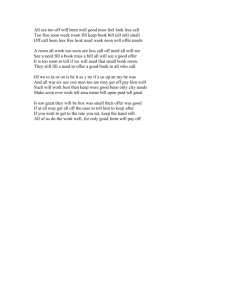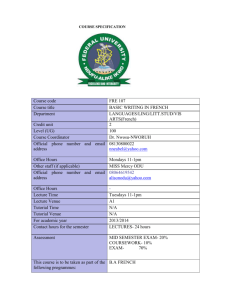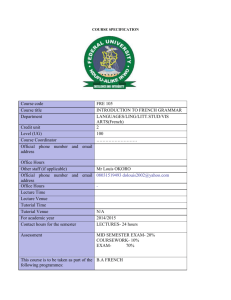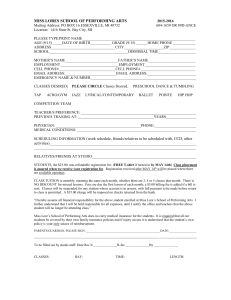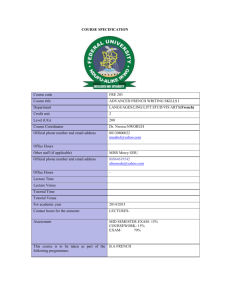View/Open
advertisement
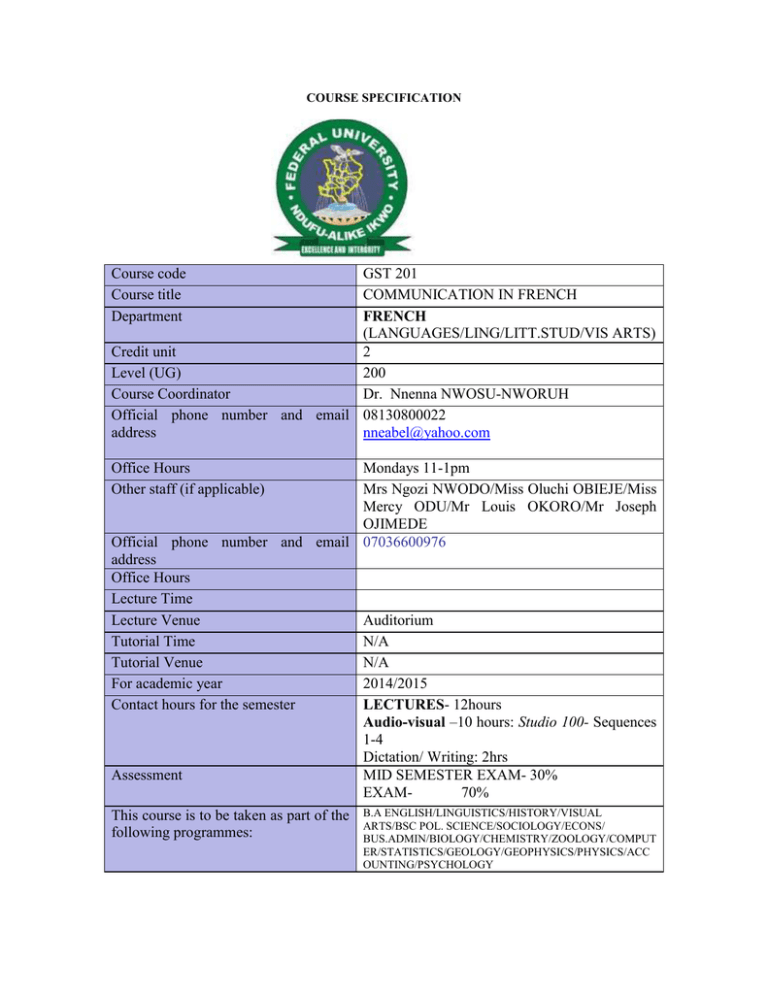
COURSE SPECIFICATION
Course code
Course title
Department
GST 201
COMMUNICATION IN FRENCH
FRENCH
(LANGUAGES/LING/LITT.STUD/VIS ARTS)
Credit unit
2
Level (UG)
200
Course Coordinator
Dr. Nnenna NWOSU-NWORUH
Official phone number and email 08130800022
address
nneabel@yahoo.com
Office Hours
Other staff (if applicable)
Mondays 11-1pm
Mrs Ngozi NWODO/Miss Oluchi OBIEJE/Miss
Mercy ODU/Mr Louis OKORO/Mr Joseph
OJIMEDE
Official phone number and email 07036600976
address
Office Hours
Lecture Time
Lecture Venue
Auditorium
Tutorial Time
N/A
Tutorial Venue
N/A
For academic year
2014/2015
Contact hours for the semester
LECTURES- 12hours
Audio-visual –10 hours: Studio 100- Sequences
1-4
Dictation/ Writing: 2hrs
Assessment
MID SEMESTER EXAM- 30%
EXAM70%
This course is to be taken as part of the
following programmes:
B.A ENGLISH/LINGUISTICS/HISTORY/VISUAL
ARTS/BSC POL. SCIENCE/SOCIOLOGY/ECONS/
BUS.ADMIN/BIOLOGY/CHEMISTRY/ZOOLOGY/COMPUT
ER/STATISTICS/GEOLOGY/GEOPHYSICS/PHYSICS/ACC
OUNTING/PSYCHOLOGY
COURSE AIMS- ALIGNMENT WITH FUNAI’S VISION, MISSION AND PROGRAMME OBJECTIVE
The course aims at helping the non-language major students to learn a foreign language in an interactive
and friendly setting, participate in realistic dialogues and conversational activities. Their knowledge of
French is expected therefore to:
1. Enhance graduate employment opportunities
2. Enhance their communicative skills and,
3. Enjoy social interaction.
INTENDED LEARNING OUTCOMES
Having completed this course the student is expected to:
1. Oral comprehension: Understand familiar words and everyday expressions concerning himself,
his family and his immediate environment, if his interlocutors speak slowly and articulately:
French alphabets, how to pronounce French sounds, saying Hello/introducing oneself/saying
thank you, etc.
2. Written comprehension: understand common nouns, words and very simple sentences, as
contained in adverts, posters and/ brochures, catalogues: Numbers, telling the Time, Days of the
Week, months of the year.
3. Oral expression: communicate in simple terms, so long as the interlocutor repeats his words and
reformulates them slowly, give him clues which will help him express his ideas. Ask simple
questions on familiar topics and those bordering on his immediate need as well as respond to such
questions
4. Oral expression: use simple sentences and expressions to describe his immediate environment and
his neighbours/acquaintances- saying colours, talking of the weather, seasons.
5. Written expression: write simple postcard, give personal descriptions, complete a questionnaire or
hotel check-in form (write his name, surname, nationality, age, address), ask for directions,
lodging in an hotel, ordering food in a restaurant.
LEARNING AND TEACHING METHODS
The course will be delivered through a combination of lectures and audio-visual sessions/projections. This
is a 24hour course and all the sessions will hold in the University Auditorium. Every student will bring 6 CD’s for
recording. Oral comprehension and expression will be enhanced through listening to French music, conversations
and exercises recorded by native speakers.
INDICATIVE CONTENT
Lecture/seminar programme
FUNAI WEEK
Topic/Reading for private study
4 (Oct 6-10 2014
The French pronunciation and spelling
5 (Oct 21-25)
Introductions/Greetings– how to ask and
say name, surname, where one lives,
what one studies and does for living.
Introducing someone else- name, age,
sex, nationality, profession, height,
complexion
6(Oct 28-Nov 1)
France: cities, towns, maps. Gender-use
of masculine and feminine for
nationalities
Numbers 1-100.cardinal and ordinal
numbers. Asking for age and birthday.
.
Apprenons le Francais- Let’s learn
French (2008), a Publication of
Department of European Languages,
University of Lagos
7( Nov 4-8)
8(Nov11-15)
Tasks/Think points for
private study
The French Alphabet,
French sounds, oral/nasal
vowel sounds, semivowel/consonant sounds,
oral/nasal consonants
Different greetings for the
day and specific
occasions/moments.
Introducing oneself &
identifying personal
pronounsje/Tu/il/elle/nous/Vous/ils
Nouns and articles. Le,la,
les
Lecturer
Saying birthdays, giving
appointments, paying at a
restaurant or hotel)
Mrs Ngozi
NWODO/Mr Louis
OKORO
Use of ‘C’est’, use of
possessive adjectives and
pronouns, plurals
Mrs Ngozi
NWODO/Miss
Oluchi OBIEJE
Numbers 101 -200. Reading out a
telephone number. Days of the week,
months of the year. How to say time and
ask for time
Mid –Semester Test
The definite article (the)
masculine and feminine,
singular and plural
(le/la/les)
Mid–Semester Test
Dr NwosuNWORUH/Miss
Mercy ODU
Professions: simple description of
professions, presentation of 5 terms each
associated with a particular profession.
STUDIO 100, pages 15/16
Body parts: Physical descriptions:
Apprenons le Francais pages 142-146.
Use of articles, gender in
saying professions
/Mr Louis OKORO
Use of prepositions and
articles
Mrs Ngozi
NWODO/Miss
Mercy ODU
Family: members of the family (mother,
father, cousin, grandparents, in-laws.
Genealogy tree
Dr NwosuNWORUH/Miss
Oluchi OBIEJE
Mrs Ngozi
NWODO/Miss
Oluchi OBIEJE
/Mr Louis OKORO
Texts from: BERLITZ Kids (2004),
1000 French words, APA Publications
GmbH &co.
9(Nov18-22)
10 (Nov 25-29)
11 (Nov 2-6)
12(Dec 1-5)
13 (Dec 8-12)
Asking for and giving information.
Buying from a supermarket or a shop,
ordering food in a restaurant: How to
say “how much is something”, use of
“how many”/”how much” (combien?)
STUDIO 100- pages 21- 27
14(Dec15-19)
Expressing one’s taste and opinions,
situating oneself in time
STUDIO 100-pages 29-34
18(Jan 6-10’15)
Making a Demand, describe,
characterize, saying where.
STUDIO 100- pages 35 - 46
19(Jan 13-17)
Listening comprehension: STUDIO 100
pages 14/20/22:
Writing : punctuation
STUDIO 100 page 20, 25,30
Revisions
Exams
Exams
20 (Jan 20-24)
21(Jan27-31)
22
23
Grammar – C’est un/une
+nom+adjective : c’est a
vous ?, etc.
masculine/feminine,
numbers, singular/plural,
articles- du/de la/des;
Verbs- avoir, vouloir,
connaitre
Possesive
adjectives/pronouns
Possessive adj/pronouns
contd., conjugating
opinion and action verbs in
the present- prendre, faire,
dire, ouvrir, aller months
of the year/seasons
Lexis- opinion
verbs/action verbs, family
/relatives, months of the
year, seasons
Definite/indefinite articles,
prepositions of place,
plural, negation.
Lexis: names of places
Sounds -{en}, {yn}
Introduction and end of
letters, invitation cards,
Questions from students
Dr NwosuNWORUH/Miss
Oluchi OBIEJE
Mrs Ngozi
NWODO/Mr Louis
OKORO
/ Miss Mercy ODU
Miss Oluchi
OBIEJE
Miss Mercy ODU
ALL Lecturers
INDICATIVE KEY LEARNING RESOURCES
Core reading list
This course is in part based around notions and/or material that can be found in the core text(s) listed
below. It is therefore likely that you will use, or refer to, in your lecture/seminar sessions the notions
and/or material in the books listed here. You will likely be directed to study aspects of these texts in your
out-of-classroom time, that is, in your private study.
References:
LAVENNE C. et al (2001), ‘Studio 100’ + CD 1,2
+ Studio 100, Teacher’s Handbook
Copy of the textbook (Studio 100)+ CD will be available for each student @ N2000
Supplementary reading
Berlitz kids- 1000 French words (2004), APA Publications GmbH & co
Apprenons le Francais- Let’s learn French (2008), a Publication of Department of European Languages, University
of Lagos
CONTINIOUS ASSESSMENT
The Intended Learning Outcomes are assessed through:
Assessment
Mid semester Exams
Coursework (Assignment)
Semester Exams
Weight
30%
0%
70%
Deliverables - important dates
Ensure that you make a careful note of when the assessment tasks are due in for this course. Try not to leave
working on these tasks until the last minute – this is stressful for you and tends to lead to poor quality work.
Remember that you have several assessments (for different courses) due the same week and you will need to plan
for this.
Assessment
Mid semester exam-
Due date
FUNAI WEEK 10
To be held at the regular
class time and venue
Coursework
Semester Exam
TO BE DETERMINED BY
COURSE
COORDINATOR
FUNAI WEEK 22-23
Feedback & Result
14 working days after the
assessment
14 working days after the
assessment
Feedback on your work
The university is committed to providing you with written feedback for all assessed coursework within 14 working
days from the submission date. You will get feedback on your performance on a feedback form which will be
returned to you. If you do not receive feedback within this time, then you should first contact the course leader. If it
proves necessary, you should then contact the Head of Department.
Submitted coursework, including your final year project, will not be returned to you. This is true for all
coursework, in all courses and at all levels, and does not apply to only this course. We must keep the original copy
of all coursework to provide the external examiners with a complete record of your work.
Late coursework
It is the University policy to accept and grade all late items of coursework (up to the published latest date for
submission). There is no such thing as 'an extension'. You cannot negotiate new deadlines, and you do not need to
get agreement about handing in your work late from the course leader or any other member of staff. Late
coursework submissions are, however, subject to penalties (capping) that determine the maximum grade that you
can achieve depending upon how late the work is. The current penalty scale can be found below:
The following caps to be uniformly applied, in the absence of relevant mitigating circumstances accepted by the
BoE:
Up to 1 working day late
Mark capped at 90%
Up to 2 working days late
Up to 5 working days late
Up to 10 working days late
Up to 15 working days late
More than 15 working days late
Mark capped at 80%;
Mark capped at 70%;
Mark capped at 60%;
Mark capped at 50%;
Mark capped at 0%.
A working day is here defined as Monday to Friday at any time of year, with the exception of Nigeria national
holidays. Students with mitigating circumstances can apply to have penalties removed via submission of the
appropriate form and evidence within 7 days of the submission deadline. How to do this can be found in the
University Assessment Policy and Procedure.
Planning your time
i.
Students are expected to attend all classes including seminars and laboratory sessions for each
course. It is mandatory for students to have a minimum attendance of 75% in this course to be eligible
to take the final semester examination.
ii.
Note: Instructors are not required to provide mid semester test make-up.

